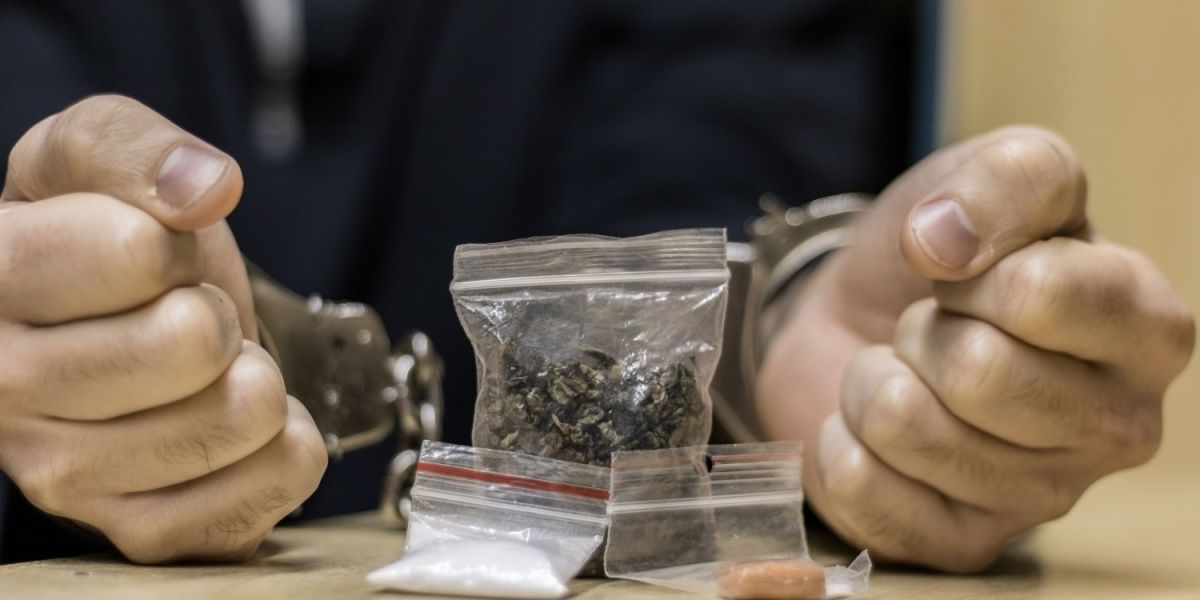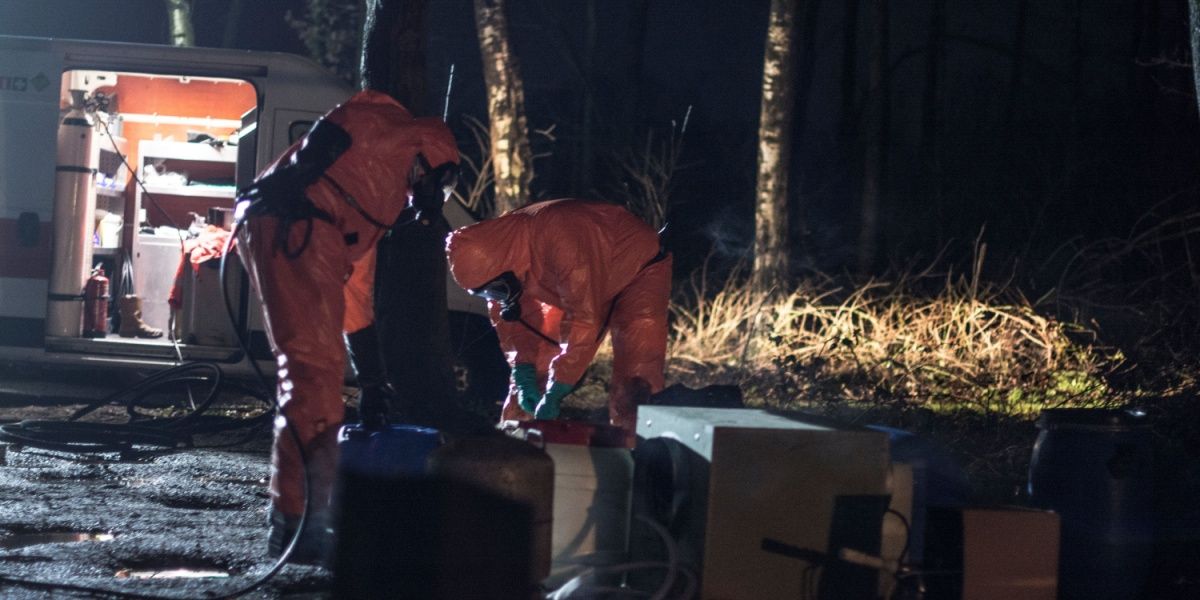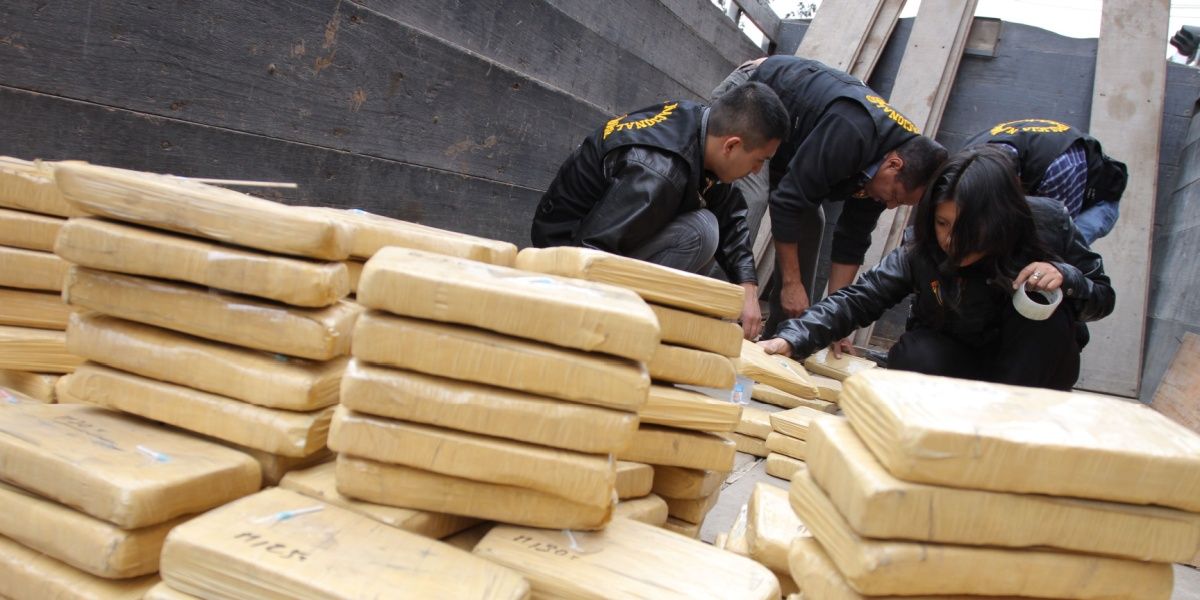Drug offenses involve the use, manufacturing, or transportation of illicit substances. These crimes affect millions of people globally and within the United States, and cost the government billions of dollars per year to address. Drug offenses can be charged at a state or federal level and can lead to fines and prison time.

What constitutes a drug offense?
A drug offense is an illegal activity involving any drug-related crime. This can apply to any federal or state drug laws and regulations regarding any controlled substance's manufacture, use, possession, sale, or transportation. These offenses can range from a misdemeanor to a first-degree felony, resulting in various penalties and punishments including prison time and fines. [1][2]
Types of drug offenses
Manufacturing
Drug manufacturing offenses involve the production of illicit substances. This offense can relate to any step of the manufacturing process, such as buying, selling, or possessing any chemicals or paraphernalia required to produce a substance, participating in the production process, or growing and cultivating plants used as illicit substances such as marijuana or psilocybin mushrooms. [3][4]
Synthetic substances, such as methamphetamine, are commonly produced in in-house labs and require specific equipment and chemicals. Stores selling these products may not necessarily be breaking the law, as they are often legal products with other uses. However, someone knowingly selling or buying products for drug manufacturing purposes could be charged with this offense. [3]
If someone is found with either the drug or manufacturing equipment, they may be able to argue that they did not intend to produce the substance. However, being caught with the substance and the necessary equipment to manufacture or cultivate it is likely to result in a drug manufacturing charge. [3][4]
Possession
Possession of an illegal substance is a drug offense that can be charged at a state or federal level. Possession can include: [5]
- Simple possession: Having an amount of a substance on your person, which is intended for personal use.
- Constructive possession: Having access to a substance in an area under your control, such as in the home or car.
- Possession with intent to supply: Having a substance with the intention to sell smaller quantities to others. This might include having a large amount of a substance, paraphernalia used in the selling of drugs such as baggies and scales, and evidence of sales such as large quantities of cash in small bills.
Laws around possession vary significantly depending on the state, type and amount of substance, and prior offenses. Being found in possession of a small amount of a controlled substance could lead to a fine or a prison sentence. These penalties can vary from $500 to $500,000 fines and 6 months to life imprisonment. [6]
According to the Federal Bureau of Investigations (FBI), over one million arrests are made each year for violations of drug laws and 85% of these arrests are for possession. [7]
Trafficking
Drug trafficking involves the illegal transportation, distribution, manufacturing, or production of controlled substances. The most common drugs involved in trafficking include heroin, cocaine, fentanyl, and marijuana. In the US, most trafficked drugs are produced or transported through Mexico. [8][9]
Drug trafficking is a federal offense and can result in a prison sentence of five years to life imprisonment and a fine of several hundred thousand to several million dollars. Penalties are greater for repeated offenses, endangerment of human life, employing or selling to minors, and using firearms. [10]
In 2023, almost 19,000 cases of drug trafficking were reported to the US Sentencing Commission. Almost half of these cases (47.5%) involved methamphetamine. Of these cases, 97.2% were given prison sentences, with an average of 82 months. [8]
Other drug offenses
Drug offenses can also include crimes associated with the use or distribution of substances, such as: [10]
- Smuggling: Smuggling involves only the movement of drugs across state or country borders. This is defined as trafficking once the selling of substances is involved.
- Racketeering: Racketeering involves engaging in illegal activity to make a profit. This can include offenses such as fraud, bribery, and extortion, which may be involved in drug operations.
- Laundering: Distribution of illegal substances often includes money laundering, which allows illegally obtained money to be used legitimately by concealing its origins.
- Behaviors: Substance use can lead to criminal behaviors, such as violence, unsafe driving, and other offenses.
The Controlled Substances Act
The Controlled Substances Act (CSA) is a list determined by the Drug Enforcement Administration (DEA) and Food & Drug Administration (FDA), which lists all substances under one of five classifications, Schedule I-V. Schedule I substances are deemed to have the highest potential for abuse and physical dependence and Schedule V the lowest. [11][12]
Additionally, substances are classified depending on whether they have any accepted medical uses. Schedule I substances are considered to have no medicinal use, while Schedule II-V have some accepted uses. Schedule II-V substances can be prescribed by a medical practitioner for a legitimate purpose. [12]
- Schedule I includes substances such as heroin, LSD, marijuana, and MDMA (ecstasy). These substances have a high potential for abuse and their use is likely to lead to physical dependence and addiction. They have no accepted medical use and cannot be prescribed.
- Schedule II includes substances such as amphetamines, cocaine, fentanyl, morphine, and hydrocodone. These substances have a high potential for abuse, may be likely to lead to physical dependence and addiction, and have some restricted medical uses.
- Schedule III includes substances such as ketamine, anabolic steroids, and buprenorphine. These substances have a potential for abuse and may lead to physical dependence and addiction. They are often used medicinally.
- Schedule IV substances include benzodiazepines such as clonazepam, diazepam, and lorazepam; tramadol; and z-drugs such as zolpidem and zopiclone. These substances have some potential for abuse, which can cause some risk of physical dependence and addiction. They are often used medicinally.
- Schedule V substances include cough medicines containing codeine, pregabalin, and lacosamide. These substances have a low potential for abuse, physical dependence, and addiction, and are often used medicinally.
The CSA was signed into law in 1970 by President Nixon and has since been amended and altered numerous times to include additional substances or change the classification of substances following drug-related events or safety concerns. [13]
Marijuana is a Schedule I controlled substance, although in many states it has been decriminalized or legalized and may be used for medicinal purposes. [12]
The difference between state and federal drug offenses
Drug offenses can be charged as either a state or federal offense, and in some cases, both. This can mean that large-scale operations involve investigation from state and federal law enforcement agencies. [13]
Federal offenses typically involve large-scale operations involving many locations, people, and large amounts of substances. For example, drug trafficking is a federal offense, as it typically involves the transportation of substances across various states and in large quantities. [13][14]
State offenses are usually smaller operations, in which crimes take place within one state. This may include transportation and distribution of drugs within an area, as well as possession charges. [13]
Marijuana laws also differ on a state and federal level. Marijuana is a Schedule I controlled substance according to federal law, although many states have decriminalized or legalized marijuana. As such, its use, possession, or sale may not be punishable by law within these states. [6]
In some states, possession of a small amount of marijuana could lead to a penalty of fines and jail time. In others, it may be legal to use marijuana recreationally or medicinally and to cultivate and grow medicinal marijuana. [3][14]
Another difference between state and federal laws is how drug offenses are categorized. Federal offenses are typically felonies with mandatory minimum sentences. In contrast, state drug offenses may be categorized as misdemeanors or felonies, incurring a range of penalties that differ by state. [2][6]
Prosecution for drug offenses
Drug offenses are reviewed and sentenced in court, where prosecution will be decided depending on the severity of the crime, the state in which the offense occurred, and any prior offenses.
Typically, a misdemeanor offense, such as simple possession of a small amount, will incur a fine of up to $1000 and a prison sentence of up to one year. This can vary from state to state, with some states giving harsher penalties for possession than others. [6][10]
Drug offenses such as trafficking and large-scale manufacturing or distribution are often considered felonies and may be subjected to minimum sentencing laws or severe state-governed sentences. [1][10]
For example, a first drug trafficking offense may incur a prison sentence of 5 years to life, while a second offense can incur 10 years to life. Trafficking offenses may also be punished by fines of up to $10 million for an individual. [10]
Smuggling substances into the US could incur a fine of up to $250,000 and up to 20 years imprisonment. [10]
Additional factors that can lead to harsher penalties include: [1][10]
- Use of a firearm
- Employing or selling to a person under the age of 18
- Endangering human life
- Prior offenses
- Establishing or maintaining drug-related operations
Minimum sentencing
If an individual is charged with a federal drug crime, they will be sentenced under federal law, which includes mandatory minimum sentencing. A minimum sentence will depend on the type and amount of drug involved in the crime and whether the individual has any prior drug offense convictions. [14]
A first offense of trafficking a Schedule I or II substance can result in a minimum sentence of 5 or 10 years imprisonment depending on the quantity of drugs involved. For example, trafficking 100g – 1kg of heroin carries a minimum mandatory sentence of 5 years, with a maximum of 40 years. Trafficking 1kg or more of heroin carries a minimum sentence of 10 years. [1]
Minimum sentences may be larger if severe harm or death has occurred or if there are additional prior convictions. For example, a crime that incurs a mandatory minimum sentence of 10 years can be increased to 15 years if the individual has committed previous similar crimes. [1]
Mandatory minimum sentencing laws mean that judges are often unable to use their discretion when reviewing and sentencing individual cases and cannot be more lenient in unprecedented circumstances. Because of this, minimum sentencing laws are sometimes considered controversial and the justification of their use is debated. [14][15]
Drug offenses FAQs
When do I legally have to take a drug test?
Law enforcement can request a drug test if they have probable cause to believe that an individual is under the influence of drugs. This could occur if the individual appears to be intoxicated and is presenting a danger to themselves or others, such as while in public or when driving. [16][17]
Drug testing may also take place during the stages of the criminal justice system, such as arrest, incarceration, probation, and parole. [18]
You do have the right to refuse a drug test, although this may result in license suspension or be used against you in court. [17]
Additionally, some employers can request drug testing, which may be a legal requirement in certain industries, such as roles in transportation, healthcare, and government organizations. [19]
What are the laws around pre-employment drug testing?
Some careers include pre-employment drug testing as a legal requirement. This includes certain government roles involving transportation or access to security-sensitive information, such as the Department of Transportation or the Department of Defense. [19]
Other employers can legally request pre-employment drug testing or testing during employment, as long as they adhere to workplace policies and legal regulations. State laws vary and it may be a legal requirement in some states for applicants to complete pre-employment drug testing for roles within healthcare, correctional facilities, and schools. [20]
Do three-strike rules apply to possession charges?
The three-strike rule refers to when an individual is charged with a serious violent felony after two or more prior serious convictions. Following the third conviction, the individual will be sentenced to mandatory life imprisonment. [21]
Serious drug offenses can be included in these convictions, which may include possession with intent to supply significant quantities of controlled substances.
This rule was enacted to ensure the most violent offenders are removed from the community and to prevent significant risk to human life. As such, simple possession or drug offenses that are not considered serious or pose little threat to human life are unlikely to count towards the three-strike rule. [21]
Do I have a right to deny a stop and search for suspected possession?
Yes, you have the right to deny consent for an officer to search you. If the officer has reason to believe that you have a weapon on you, they are permitted to conduct a pat-down for weapons. Suspicion of possession is not grounds for an officer to conduct a search if consent is not given. Without consent, the officer must first obtain a search warrant. [22][23]




